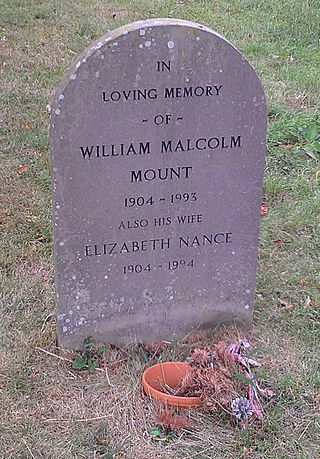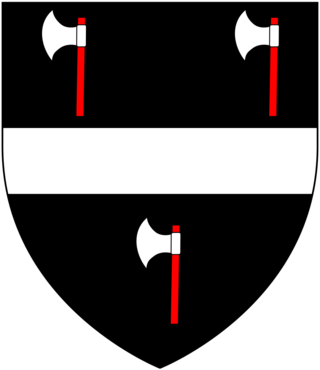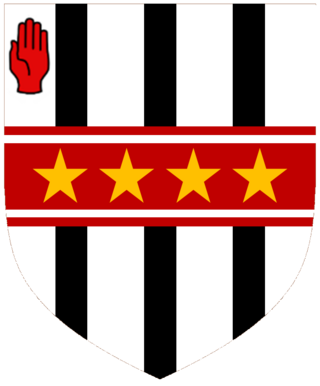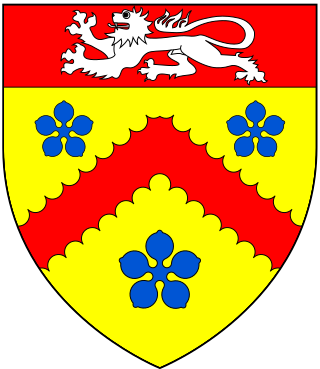
Lieutenant-Colonel Sir Edmund Castell Bacon, 13th and 14th Baronet KG , KBE , KStJ , JP (18 March 1903 – 30 September 1982) was a British landowner and businessman.

Lieutenant-Colonel Sir Edmund Castell Bacon, 13th and 14th Baronet KG , KBE , KStJ , JP (18 March 1903 – 30 September 1982) was a British landowner and businessman.
As the Bacon baronetcy of Redgrave in the County of Suffolk is the oldest extant English baronetcy (created in the Baronetage of England on 22 May 1611), Sir Edmund was the Premier Baronet of England.
He was both the 13th and 14th Baronet of Bacon, since the 8th Bacon Baronet of Mildenhall in the County of Suffolk (created in the Baronetage of England on 29 July 1627), had succeeded as the 7th Bacon Baronet of Redgrave in 1755 when his third cousin, the 6th Bacon Baronet of Redgrave, died without heirs.
Sir Edmund was born in 1903 at Raveningham Hall, the son of Sir Nicholas Bacon, 12th Baronet, and Constance Alice Leslie-Melville. [1] He was educated at Wixenford, Eton, and Trinity College, Cambridge. [2]
On 15 January 1936, he married Priscilla Dora Ponsonby (1913–2000), daughter of Sir Charles Ponsonby, 1st Baronet. They had five children. [3] Their daughter Sarah is married to Sir Paul Nicholson. [1]
Sir Edmund was appointed deputy lieutenant of Norfolk in 1939. [1]
He commanded the 55th (Suffolk Yeomanry) Anti-Tank Regiment of the Royal Artillery in the Second World War and he was mentioned in despatches. He became Honorary Colonel of the 308 (Suffolk and Norfolk Yeomanry) Field Regiment, Royal Artillery between 1961 and 1967. [1]
He was appointed as a justice of the peace for Norfolk in 1944. He succeeded to the family baronetcies on 1 January 1947 and he was Lord-Lieutenant of Norfolk between 1949 and 1982. Sir Edmund held several quango and business positions: chairman of British Sugar Corporation (1957–1968); Pro-Chancellor of the University of East Anglia (1964–1973); chairman of the Agricultural North East Development Council (1966–1982) and director of Lloyds Bank. [1]
Sir Edmund died on 30 September 1982, aged 79. [1]


Sir Nicholas Bacon was Lord Keeper of the Great Seal during the first half of the reign of Queen Elizabeth I of England. He was the father of the philosopher and statesman Sir Francis Bacon.

There have been three baronetcies created for members of the Bacon family, all in the Baronetage of England. As of 2008, one creation is extinct and two of the creations are extant. The extant titles have been merged since 1755.

Lieutenant-Colonel Sir William Malcolm Mount, 2nd Baronet, TD, was a British Army officer, High Sheriff of Berkshire and maternal grandfather to David Cameron, former UK Prime Minister and leader of the Conservative Party.
Sir Nicholas Hickman Ponsonby Bacon, 14th and 15th Baronet,, is a British landowner, businessman and philanthropist. Sir Nicholas is also the Premier Baronet of England.

The Bunbury Baronetcy, of Bunbury, Oxon and Stanney Hall in the County of Chester, is a title in the Baronetage of England. It was created on 29 June 1681 for Thomas Bunbury, Sheriff of Cheshire from 1673 to 1674 and the member of an ancient Cheshire family. His grandson, Henry, the third Baronet, and great-grandson, the fourth Baronet, both sat as Members of Parliament for Chester. The latter died unmarried at an early age and was succeeded by his younger brother, the fifth Baronet. He was a clergyman. On his death in 1764 the title passed to his eldest son, the sixth Baronet. He represented Suffolk in the House of Commons for over forty years but is best remembered for his marriage to Lady Sarah Lennox. He died childless in 1821 and was succeeded by his nephew, the seventh Baronet. He was the son of Henry Bunbury, younger son of the fifth Baronet. The seventh Baronet was a distinguished soldier and politician. His eldest son, the eighth Baronet, was High Sheriff of Suffolk in 1868, and Fellow of the Royal Society. He died childless in 1886 and was succeeded by his younger brother, the ninth Baronet. He was Liberal Member of Parliament for Bury St Edmunds. He died unmarried in 1895 and was succeeded by his nephew, the tenth Baronet. He was the son of Colonel Henry William St Pierre Bunbury, third son of the seventh Baronet. He served as High Sheriff of Suffolk in 1908 and was a Deputy Lieutenant of the county. On his death in 1930 the title passed to his son, the eleventh Baronet. He was High Sheriff of Suffolk in 1936 and was a Deputy Lieutenant of the county. His son, the twelfth Baronet, was High Sheriff of Suffolk in 1972. As of 2014 the title was held by the latter's second but eldest surviving son, the thirteenth Baronet, who succeeded in 1985.
Sir Edmund Bacon, 2nd Baronet was an English baronet and politician. Edmund was wealthy, possessing around £6,000. He was a nephew of Francis Bacon and a friend of Sir Henry Wotton with whom he would often talk about his uncle's scientific experiments. Edmund's beliefs about religion are unknown, although he was described by a Puritan chaplain named Robert Allen as "Lovers of piety and justice, and friends to the church of God."

The Wrey Baronetcy, of Trebitch in the Duchy of Cornwall, is a title in the Baronetage of England. It was created on 30 June 1628 for William Wrey (d.1636), 2nd son of John Wrey of Trebeigh, St Ive, Cornwall, a member of an ancient Devon family. The third Baronet was a supporter of the Royalist cause and sat as Member of Parliament for Lostwithiel after the Restoration. He married Lady Anne, third daughter and co-heir of Edward Bourchier, 4th Earl of Bath, and a co-heir to the barony of Fitzwarine. The fourth Baronet represented Liskeard and Devon in the House of Commons. The fifth Baronet was Member of Parliament for Camelford while the sixth Baronet represented Barnstaple.
The Boileau Baronetcy, of Tacolneston Hall in the County of Norfolk, is a title in the Baronetage of the United Kingdom. It was created on 24 July 1838 for John Boileau, antiquary, archaeologist, justice of the peace, and deputy lieutenant and high sheriff for Norfolk. His ancestor Charles Boileau, Baron of Castelnau and St Croix de Boriac, had fled to England after the revocation of the Edict of Nantes in 1685.
Three baronetcies were created for persons with the surname D'Oyly, two in the Baronetage of England and one in the Baronetage of the United Kingdom. One creation is extant as of 2008.

The Jaffray Baronetcy, of Skilts in the Parish of Studley in the County of Warwick, is a title in the Baronetage of the United Kingdom. It was created on 8 October 1892 for the journalist and newspaper proprietor John Jaffray. He was the co-founder of the Birmingham Post and Birmingham Mail.

There have been three baronetcies created for persons with the surname Cooke, two in the Baronetage of England and one in the Baronetage of Ireland. One creation is extant as of 2013.

The Duke of York's Own Loyal Suffolk Hussars was a Yeomanry regiment of the British Army. Originally formed as a volunteer cavalry force in 1793, it fought in the Second Boer war as part of the Imperial Yeomanry. In the World War I the regiment fought at Gallipoli, in Palestine and on the Western Front. The unit was subsequently converted into a Royal Artillery unit, serving in the anti-tank role North Africa, Italy and France during World War II. The lineage is maintained by No. 677 Squadron AAC.

Sir Nicholas Bacon, 1st Baronet, of Redgrave, Suffolk, English Member of Parliament. In 1611 he became the first man to be made a baronet. Bacon would serve on many commissions. The Privy Council constantly called upon him to conduct inquiries. He was a puritan leader in Suffolk. The power and prestige of the puritan ministries in many areas of the country owed their power to Bacon. Sir Nicholas Bacon was considered a good Christian by his contemporaries. Especially his chaplain, Robert Allen. Robert Allen stated that Sir Bacon's wife was dedicated to "God's holy religion and worship by every good and Christian means in the sight of men."

Sir Robert Bacon, 3rd Baronet of Redgrave (1574–1655) was an English landowner.
Sir Edmund Bacon, 4th Baronet was an English politician.
Sir Edmund Bacon, 5th Baronet, of Gillingham, Norfolk, was a British Whig politician who sat in the House of Commons from 1722 to 1738.
Edmund Bacon may refer to:

Sir Edmund Bacon, 6th Baronet, of Garboldisham, Norfolk, was a British politician who sat in the House of Commons between 1710 and 1741.
Sir Edmund Henry Knowles Lacon, 3rd Baronet was an English businessman and liberal Conservative politician who sat in the House of Commons in two periods between 1852 and 1885.
SirBassingbourne Gawdy, of West Harling, Norfolk, was an English lawyer and judge, knight, and Member of Parliament.